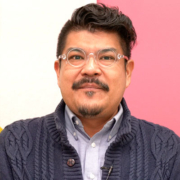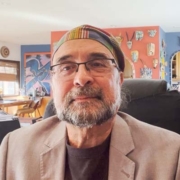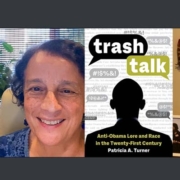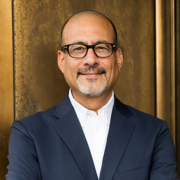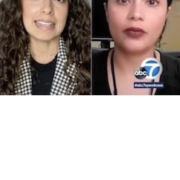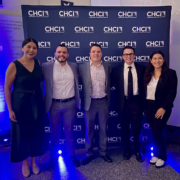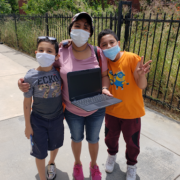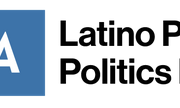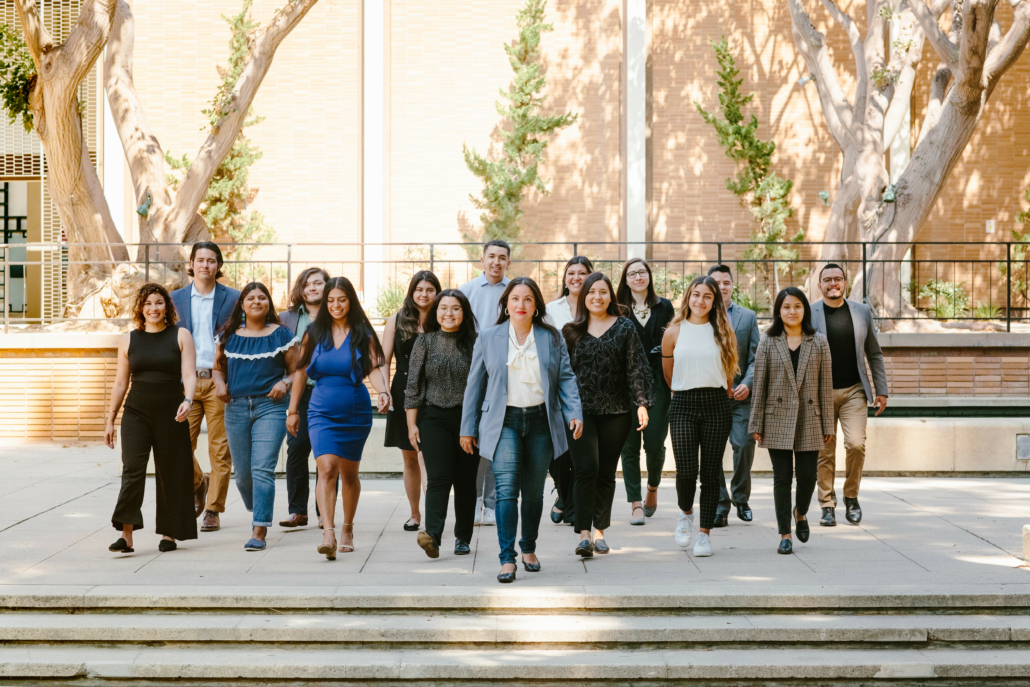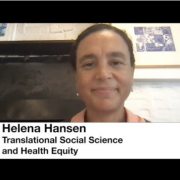[Listen] UCLA professor, Nat Geo Explorer and archaeologist Justin Dunnavant sits down with Grammy-nominated trumpeter Chief Xian aTunde Adjuah to discuss ancestral memory, creating new instruments, and stretch music—an expansion of jazz.
New book “Cartographic Memory: Social Movement Activism and the Production of Space” maps Chicana/o and LatinX activism and space creation in 1960s Fruitvale, Oakland California. UCLA Geography professor and author Dr. Juan Herrera discusses the research he conducted including oral histories, ethnography, and archival research. Herrera goes into how power dynamics shape the production of space, and the power of social movements to create space, institutions, and social relationships, and how many of those spaces and institutions affect life in communities today.
0:04 – Intro
0:40 – Main argument and contribution of the book
3:01 – Specifics about Fruitvale community movement politics
5:09 – What is Cartographic Memory and how is it important?
7:28 – Choices in how to tell the stories in the book
10:24 – How does the book pertain to the contemporary environment?
UCLA Geography – https://geog.ucla.edu
Interviewer: Dr. Celia Lacayo, Associate Director of Community Engagement, UCLA Social Sciences & Professor Chicana/o & Central American Studies and African American Studies Department
Subscribe to our YouTube channel
Subscribe to LA Social Science and be the first to learn more insight and knowledge from UCLA’s Division of Social Sciences experts and other faculty.
The Trump Paradox: Migration, Trade, and Racial Politics in US-Mexico Integration – A collection of essays from top scholars in the US and Mexico. LA Social Science spoke with UCLA professor Raúl Hinojosa, Lead Author and Editor, who discusses the importance of the trade and immigration policies surrounding US-Mexico relations, and the impacts of those policies. Dr. Hinojosa also addresses some of the myths associated with voter beliefs, and explains the paradox.
0:04 – Intro
0:48 – Main argument and contribution of the book
4:50 – New politics around Mexico-US trade and migration
8:55 – How do current racial politics affect future politics?
12:07 – How does this pertain to contemporary times and locality?
UCLA César E. Chavez Department of Chicana/o and Central American Studies – https://chavez.ucla.edu
Interviewer: Dr. Celia Lacayo, Associate Director of Community Engagement, UCLA Social Sciences & Professor Chicana/o & Central American Studies and African American Studies Department
Subscribe to our YouTube channel
Subscribe to LA Social Science and be the first to learn more insight and knowledge from UCLA’s Division of Social Sciences experts and other faculty.
“Trash Talk: Anti-Obama Lore and Race in the Twenty-First Century” explores the rumors, legends, and conspiracy theories surrounding Barack Obama since his initial run for President in 2004, and continuing to present day. We spoke with author and professor Patricia A. Turner (Departments of African American Studies, and World Arts and Culture/Dance) who discusses how these rumors, legends, and lore often focus on identity by attacking Barack Obama’s faith, patriotism, sexual orientation, and citizenship, and speaks to the impact of such attacks on the political and sociological landscape both now and throughout history.
0:04 – Intro
0:46 – Main argument and contribution of the book
1:38 – Description of Anti-Obama lore
4:18 – Did you think Obama’s presidency would constitute a post-racial America?
6:32 – Why should this folklore be taken into account?
8:06 – Why is this a critical book to read and/or assign?
Dept. African American Studies – https://afam.ucla.edu
Dept. of World Arts and Culture/Dance – https://www.wacd.ucla.edu
Arthur Ashe Legacy Program – https://arthurashe.ucla.edu
Interviewer: Dr. Celia Lacayo, Associate Director of Community Engagement, UCLA Social Sciences & Professor Chicana/o & Central American Studies and African American Studies Department
Subscribe to our YouTube channel: https://www.youtube.com/channel/UCGvpkOpiOGU4f5lSwRygbqg?sub_confirmation=1
Subscribe to LA Social Science and be the first to learn more insight and knowledge from UCLA’s Division of Social Sciences experts and other faculty.
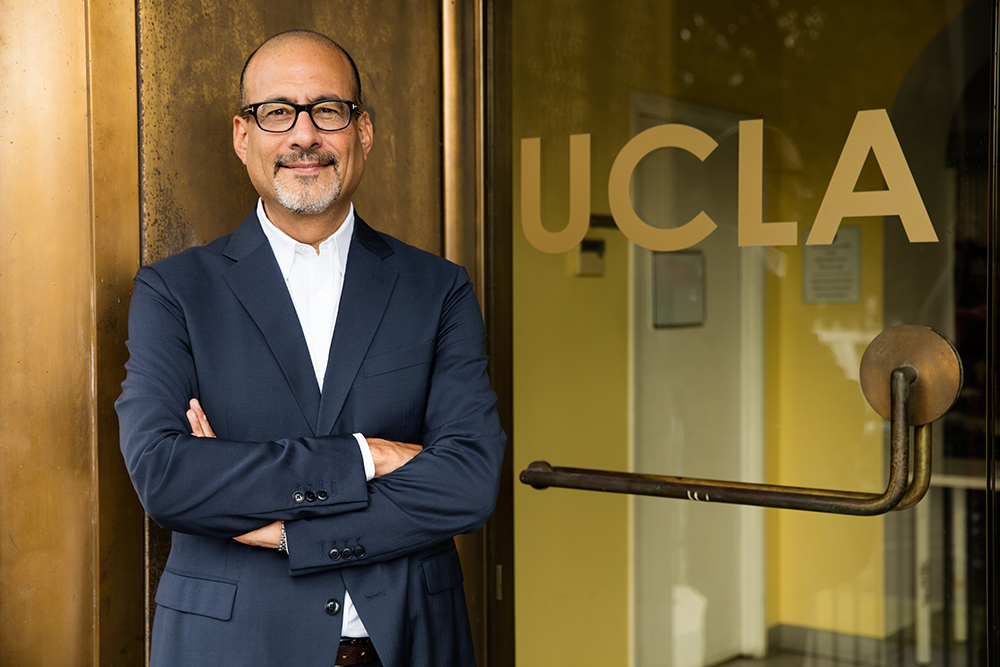
Abel Valenzuela Jr. has been a faculty member in the UCLA College’s Division of Social Sciences for nearly three decades, serving as a professor of labor studies, Chicana/o and Central American studies, and urban planning. He’s also the director of UCLA’s Institute for Research on Labor and Employment and a nationally recognized authority on labor issues, immigration, and urban poverty and inequality.
Last month, Valenzuela took on the role of interim dean of social sciences following the appointment of the division’s former dean, Darnell Hunt, to the post of executive vice chancellor and provost. He will remain in the position through the end of the 2023–24 academic year.
Valenzuela spoke to us about charting a path forward for the division, the importance of public engagement and how working as a dishwasher and “carwashero” in his early years instilled a work ethic that still drives him.
What does it mean to follow in the footsteps of former Dean Hunt?
Darnell Hunt is a longstanding faculty member and a gifted administrator and scholar who has pushed his discipline and the social sciences division on a formidable pathway of local and civic engagement, problem-solving and driving policy. He’s done this by drawing on UCLA’s greatest talent — its faculty and student body.
During my own leadership of the Institute for Research on Labor and Employment, I was able to enhance our well-established reputation for engaging Los Angeles through empirical, policy-driven research and by providing our students with research opportunities on topics important to their own lives. In my work, I often consulted with Dean Hunt to share benchmarks, discuss opportunities and ensure that our work was aligned and supported by the division. He was instrumental to our growth and success.
As I look ahead to this next chapter, I feel honored to continue his mission, and I’m confident that our shared efforts will enhance and strengthen UCLA’s public mission and dedication to excellence in problem-solving in academic research, public policy and other areas that impact the world and people’s lives.
What qualities make the social sciences division special?
The division is large and robust and includes nearly 20 academic departments and programs — and it’s driven by brilliantly accomplished faculty and students who engage deeply and thoughtfully with each other.
That idea of engagement is paramount — not only within the university but, importantly, with the broader world. The research being done in our division engages every corner of our city and our world, and it has a formidable impact. I continue to be amazed, as I reflect on my 30 years at UCLA, at all the accomplishments and discoveries our division makes on a regular basis. When I travel, I marvel at the impact our alumni are having in the world — their reach is seemingly everywhere you turn.
What are your top priorities as interim dean?
Dean Hunt was an excellent steward of the division, and his visionary and steadfast focus on changing the world through local engagement and on promoting social science that matters and that focuses on the public good are all priorities that align with my own work and philosophy. In my new leadership role, that vision will continue.
In addition, his dedication to faculty recruitment and retention and to advocating for our division with senior leadership are priorities I will be embracing as interim dean.
And finally, I intend to devote my attention to two key matters: staff morale and workplace issues, and graduate student funding — both critical to maintaining excellence in our division, as well as our competitive edge.
How can the members of the division show support now and going forward?
We can build community through reaching out to each other and also by being cognizant of the fact that we are navigating uncertain times. We need to be patient, respectful of others and kind to a fault in supporting one another.
Secondly, if you have the resources and are able to give, give to UCLA so that we can redistribute your generosity in the form of fellowships, summer internships, and in other ways that build community and support our students through research and similar opportunities.
You’ve been a teacher for a long time. What does teaching mean to you?
Teaching is connecting. It’s gratifying and exhilarating. It’s also a lot of hard work. Teaching is reciprocal — you learn when you teach. Some of the best teachers and classes in the world are here at UCLA.
My favorite advice to share with students when we discuss civic, cultural and other types of interventions is that the research process is long, and when you’re trying to impact policy, that impact is incremental. Patience is a virtue, and if you have it, you can use it in meaningful and effective ways. Small, steady steps and forward movement are the key to winning — our work is a marathon, not a race.
Is there an interesting or little-known fact about you we could share?
As a teenager, I worked at McDonald’s; as a Union 76 “carwashero” — a vacuum attendant, to be precise; as a dishwasher at White Memorial Hospital in Boyle Heights; and shortly after high school graduation, I became a bank teller. Hard work and multiple skill sets have always been a part of my experience and will guide my work ethic for the division.
How will you determine whether you’ve been successful?
Beyond the standard metrics UCLA uses to evaluate deans, I’ll leave it up to my colleagues — department chairs, research unit directors, faculty members and students — to say if my work as interim dean surpassed their expectations and standards. At UCLA, we’re all very vocal!
Finally, I’ll constantly remind myself that enhancing student success and excellence in academic outcomes is a primary catalyst in all of my decision-making.
I’m honored, humbled and thankful to the campus’s senior leadership and to Executive Vice Chancellor and Provost Hunt for their confidence in me as I undertake this new leadership assignment.

ABC7’s Anabel Muñoz (left) speaks with UCLA Latino Policy and Politics expert, Melissa Chinchilla (right) about the rise of Latino homelessness in Los Angeles
By Alise Brillault
The UCLA Latino Policy and Politics Institute (UCLA LPPI) maintains a talented bench of over 40 faculty experts whose diverse areas of research and expertise are helping shape public narratives in American politics and driving the media’s focus on the unique experiences of the nation’s growing Latino communities.
Media and the press play a powerful role as the arbiters in deciding who gets to be a part of the American story – and despite the numerosity of Latino communities throughout the U.S., Latinos still remain largely invisible in the media and in policy debates. As UCLA LPPI research has demonstrated, this lack of representation means that Latinos, their lives, their concerns, and their triumphs are left out of the national narrative and the public’s perception of the American identity.
UCLA LPPI faculty experts are leading the charge in overturning these exclusionary narratives by spotlighting the rich and nuanced experiences of Latino communities, influencing policy debates and the raising visibility of the Latino community. The coverage that these experts have been receiving in prominent news outlets add a unique Latino lens to every emerging policy debate and national political development.
Dr. Melissa Chinchilla, assistant project scientist at the UCLA David Geffen School of Medicine and health services specialist at the VA of Greater Los Angeles, is a leading expert on Latino homelessness affiliated with UCLA LPPI. Her work has been featured in recent media stories about the Los Angeles Homeless Services Authority’s latest homeless count. Outlets including ABC7 and LAist have sought out Chinchilla’s expertise in understanding why the population of unhoused Latinos in Los Angeles has grown by 26% in the last two years – the highest rate of any racial or ethnic group.
“These news features are helping address the invisibility of the Latino community within the homelessness crisis,” Chinchilla said. “Many Latinos who live in overcrowded or substandard housing have historically been overlooked in narratives about homelessness. However, with the onslaught of the COVID-19 pandemic and the rise of Latinos entering the formal homeless system, it is more critical than ever to center the needs of our most vulnerable community members in the media and beyond.”
An assistant professor of environmental policy and urban planning at UC Irvine, Dr. Michael Méndez is another UCLA LPPI expert whose research has been heavily featured in news coverage around climate change and recent environmental disasters. From NPR, to the Los Angeles Times, to ABC7, Méndez has been a go-to source for national news outlets in understanding the ramifications of extreme weather events and natural disasters on Latino and immigrant communities.
“Latinos have a long history of leading the way on climate action, given that they are disproportionately affected by climate-related extreme weather and natural disasters,” explained Méndez. “The media plays a key role in bringing these stories to light so that environmental policy discussions and decisions led by our policymakers meaningfully prioritize the unique needs and perspectives of Latino communities.”
UCLA LPPI expert Dr. David Hayes-Bautista’s latest research centering the economic contributions of Latinos has been highlighted in leading news outlets including NBC and Al Día. Hayes-Bautista, director of the UCLA Center for the Study of Latino Health and Culture, co-authored the Latino Donor Collaborative’s 2022 U.S. Latino GDP report demonstrating that U.S. Latinos would represent the 5th largest economy in the world if they were an independent country. U.S. Latinos’ economic output would put them ahead of nations including the United Kingdom, India, and France.
“The results of this study directly contradict the prevalent stereotypes of Latinos as ‘lazy’ or ‘criminal’ often perpetuated by the media. Sharing these data with prominent news outlets allows us to illuminate how hardworking Latinos truly are and how valuable they are to the health and growth of the U.S. economy, now and into the future.” said Hayes-Bautista.
Increased media attention on UCLA LPPI experts’ innovative research expands visibility on the issues that Latinos care about most. It helps build public awareness and urgency around the need to expand resources and opportunities for the country’s youthful Latino communities. And above all, it showcases the contributions of Latinos as leaders in bringing forth a more prosperous, environmentally resilient, and socially equitable nation.
by Alise Brillault
UCLA LPPI experts and policy fellows were well represented at the Congressional Hispanic Caucus Institute (CHCI) Leadership Conference in Washington, D.C. on September 12-15, 2022. CHCI is a leading national organization that convenes members of Congress and other public officials, corporate executives, nonprofit advocates, and thought leaders to discuss issues facing the nation and the Latino community. Taking place at the onset of Hispanic Heritage Month, the conference sought to highlight Latino excellence through an offering of 26 sessions featuring over 200 thought leaders and elected officials – including remarks from President Joe Biden and Vice President Kamala Harris.
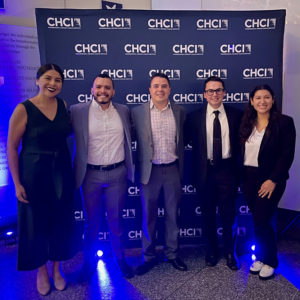
Pictured left to right: Jessie Hernandez-Reyes, Paul Barragan-Monge, Rodrigo Domínguez-Villegas, Nick González, and Bryanna Ruiz Fernandez
Paul Barragan-Monge, director of mobilization at UCLA LPPI, and Rodrigo Domínguez-Villegas, UCLA LPPI director of research, were featured panelists in two different sessions during the week. Barragan-Monge spoke in a breakout session sponsored by UCLA LPPI centered on criminal justice reform. With Latinos accounting for increasingly higher percentages of people in U.S. prisons, the conversation focused on how policymakers and community leaders can pursue comprehensive justice reforms and support formerly incarcerated Latinos in successfully reintegrating back into their communities.
In a breakout session sponsored by Casey Family Programs, Domínguez-Villegas spoke on how to strengthen communities to reduce Latino family separation. From acute crises such as family separation at the border, to longstanding socioeconomic inequities, Domínguez-Villegas discussed with other panelists about the innovative policies and interventions needed to protect Latino families’ holistic safety and well-being.
UCLA LPPI was able to sponsor the attendance of three alumni policy fellows, Bryanna Ruiz Fernandez, Jessie Hernandez-Reyes and Nick González, as well as current policy fellow Rocio Perez.
Ruiz Fernandez had a powerful experience reconnecting with her former UCLA LPPI colleagues in the nation’s capital. Having recently graduated from UCLA with a B.A. in political science and chicana/o studies, Ruiz Fernández is now working as a financial analyst at the Consumer Financial Protection Bureau (CFPB) in Washington, D.C.
“Sharing a space filled with Latina/o trailblazers in public policy, as a UCLA LPPI alumni, highlighted the abundance of opportunities I have been granted as a result of mentors like Sonja Diaz and Rodrigo Domínguez-Villegas, who are dedicated to opening doors for young Latinos hoping to enact meaningful change across our communities,” Ruiz Fernández remarked.
González, now a second-year Master of Public Policy student at Georgetown University and intern for U.S. Senator Alex Padilla, was inspired by Latino leaders he met at the conference and the diverse fields they work in.
“Aside from reconnecting with my UCLA LPPI colleagues, my favorite aspect of the conference was networking with so many Latinos in public policy from a broad range of issues and sectors,” said González. “Hearing about the diversity of their work felt like a reminder of LPPI’s mantra that every issue really is a Latino issue.”
Perez, currently a Master of Public Policy student at UCLA, was likewise inspired by the community of Latino leaders with whom she was able to network – and some of the high-profile speakers.
“It was incredible to learn about the journeys of Latinos in different industries and network with empowering individuals, as well as reconnect with friends and mentors,” Perez shared. “One of the highlights was witnessing remarks by both the Vice President and President of the United States – who would have thought I would be there!”
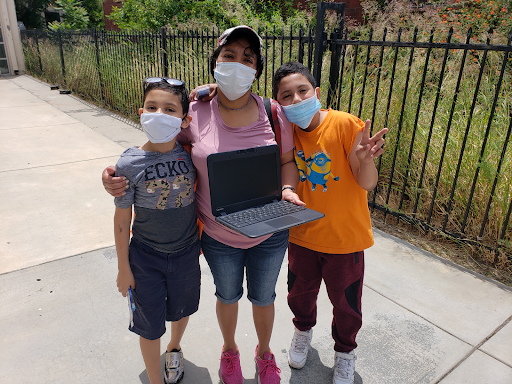
Single-mom and full-time SEIU-USWW Janitor Jenny Meija and her two sons pictured with a computer provided by Building Skills Partnership’s digital equity initiatives.
By Lucy González, Graduate Student Researcher; Sophia L. Ángeles, Graduate Student Researcher; Janna Shadduck-Hernández, Project Director, UCLA Labor Center
There is no doubt the COVID-19 pandemic has had a devastating impact on families. Low-wage essential workers, such as janitors, have been hit particularly hard. The work demands placed on janitors dramatically increased as new safety standards were instated by 2020 COVID-19 protocols. Front-line janitors were at a higher risk of contracting COVID-19, and their families also faced serious financial challenges due to job loss and reduction of work hours. The difficulty of juggling parent-worker responsibilities impacted their well-being and mental health. However, few studies have explored the unique experiences of janitor parents and their critical role in the pandemic.
In the fall of 2021, the UCLA Labor Center conducted 16 interviews with janitor parents who are members of the Building Skills Partnership and SEIU-USWW (Service International Employees Union-United Service Workers West) and have children attending LAUSD schools. The study’s goal was twofold: 1) to understand how changing working conditions affected janitors as parents and workers and 2) to understand how an ever-evolving year of online learning shaped parent workers’ ability to support their children. Preliminary findings point to janitor parents’ resiliency in light of the challenges they encountered.
First, our research team found that the sanitation training janitor parents received in the workplace made them acutely aware and critical of their children’s school sanitary practices. Selene,* a Guatemalan mother of two students, shared her worries after learning that her children were tasked with disinfecting shared spaces. She cited that disinfection practices needed to be performed by professionals on a daily basis. Janitor parents’ access to specialized training equipped them to act as health brokers as they consistently discussed best health practices with their children to keep them safe from COVID-19.
Reflecting nationwide trends, more than half of the janitor parents reported that their children struggled academically. Parents cited the lack of personalized communication and consistent support from teachers and school staff as contributing factors. Iris, a Latina mother of two, shared that she reached out to her daughter’s school counselor for help, but never heard back. She believed this lack of support was due to her Latina ethnicity, as she had received negative responses from school staff when she called speaking Spanish versus the more positive responses she experienced when she spoke English.
Single janitor parents also consistently struggled. Nora, an Honduran single mother of two children with special needs, shared how burnt out she was juggling work and parenting since the start of pandemic:
“As a single mother, how is it going on a daily basis? Very hard. It is very hard because I have to be at 100% … I go to work at 6pm until 2:30am … I sleep for just 3 hours … Then go drop them off … Then I take classes … After, I have to pick up my sons. Then I serve them dinner. Can you imagine? I have no life.”
To support janitor parents, we suggest the following recommendations::
- Provide coordinated support and resources for working parents, particularly single parent households (e.g., flexible childcare options, financial assistance).
- Ensure that school-parent communication is multilingual and through varied and accessible formats.
An article on this research is forthcoming. Read our previous report on the UCLA Labor Center’s programs with worker parents, Learning Together! An Innovative Tutoring Program for Low-Wage Janitor, Garment and Domestic Worker Children (click HERE to download).
Lucy González is a graduate student researcher with the UCLA Labor Center and is a recent MSW graduate. She plans to be a school social worker to work on creating a safe and culturally inclusive school environment for all children.
Sophia L. Ángeles is a graduate student researcher with the UCLA Labor Center’s Worker and Learner project and a PhD candidate in the UCLA School of Education and Information Studies.. Her research focuses on the intersection of immigration and language to examine newcomer youths’ educational experiences and their K–16 trajectories.
Janna Shadduck-Hernández, Ed.D., is a project director at the UCLA Labor Center and teaches for UCLA Labor Studies and the Graduate School of Education and Information Studies. Her research and teaching focus on developing culturally relevant, participatory educational models with first- and second-generation university students, community members, and youth, with a focus on the organizing efforts of low-wage workers to combat labor and workplace violations.
* All names are pseudonyms to protect our participant’s identity.
“Latino Policy and Politics Institute Founding Executive Director Sonja Diaz, Center, with past and current institute staff and policy fellows. Photo by James Michael Juarez.”
The UCLA Latino Policy and Politics Initiative has officially become the UCLA Latino Policy and Politics Institute (UCLA LPPI), thanks to $3 million in ongoing annual funding from the state of California.
The funding, championed by the Latino Legislative Caucus, was initially secured in 2021 and initiated UCLA LPPI’s transition into a permanent research fixture with a robust fellowship program and a network of nearly 50 affiliated faculty experts across UCLA’s College and professional schools.
Founded in 2017 through a partnership between UCLA’s Luskin School of Public Affairs and division of social sciences, UCLA LPPI was launched to address the most critical domestic policy challenges facing Latinos and other communities of color. Since its inception, the institute has utilized the power of research, advocacy, mobilization and leadership development to propel policy reforms that expand genuine opportunity for all Americans.
Under the leadership of Sonja Diaz, UCLA LPPI’s founding director, the institute has gained national standing as a leading Latino policy think tank. Further, it has become a critical piece of infrastructure in UCLA’s march toward achieving federal designation as a Hispanic-Serving Institution by 2025.
Some of UCLA LPPI’s key stakeholders shared the following thoughts on the significance of the institute’s work and the transition from an initiative to an institute with long-term sustainability:
“As chair of the Latino Legislative Caucus, I am so grateful for the Latino-centric research from UCLA LPPI that has helped us formulate the policies our communities need most. Latinos play an essential role in California, yet we are disproportionately impacted by issues like the gender pay gap and disparate health outcomes. It is critical that we have a Latino-focused think tank with readily available data on the various topics that Latinos care about most.” –State Sen. María Elena Durazo
“It would stand to reason that the state with the largest number of Latinos in the country would recognize the need for a permanent voice on these matters, especially at UCLA – a vanguard of public higher education. This transition reflects the hard work of UCLA LPPI’s original founders and the growing influence of our ‘gente’ in academia and beyond. I applaud UCLA and the staff of UCLA LPPI, and I look forward to greater things and continued collaboration.” –Juan Cartagena, UCLA LPPI advisory board member and president emeritus of LatinoJustice PRLDEF
“As a member of the California Latino Legislative Caucus, we refer to data from UCLA LPPI to inform our policymaking on the issues that directly impact California’s diverse Latino communities. I’m especially appreciative of the gender lens that UCLA LPPI applies in its research products, which has played a key role in our Unseen Latinas Initiative. UCLA LPPI’s transition to an established research institute will ensure we are pushing for the right legislative solutions for years to come.” –State Sen. Lena Gonzalez
“The Chicano Studies Research Center shares a strong alignment with UCLA LPPI’s scholarly research on the most pressing social and political issues affecting diverse Latinx communities in the U.S. As UCLA LPPI transitions into an institute, we look forward to deepening our partnership and bolstering our shared commitment to raise the profile of Latino scholarship on campus and beyond.” –Veronica Terriquez, director of the UCLA Chicano Studies Research Center.
This story and photo were submitted to L.A. Social Science by Alise Brillault (she/her), Communications Manager of the Latino Policy & Politics Institute.
LA Social Science interviewed Dr. Helena Hansen, an MD, Ph.D. psychiatrist-anthropologist, Professor and Chair of Research Theme in Translational Social Science and Health Equity, as well as Associate Director of the Center for Social Medicine at UCLA’s David Geffen School of Medicine.
Interview Chapters:
00:35 – Introduction and Welcome of Dr. Helena Hansen
10:06 – Dr. Hansen, please talk about some of the research outcomes as it relates to different communities and how inequalities evolve or how they’re addressed in academic medicine?
15:48 – Please talk to us about your new book, White Out: How Racial Capitalism Changed the Color of Heroin in America
28:29 – Dr. Hansen, please tell us again the name of your book and when it will be available to purchase.
Subscribe to LA Social Science and be the first to learn more insight and knowledge from UCLA’s Division of Social Sciences experts and other faculty about upcoming video/audio sessions and posts about current issues


